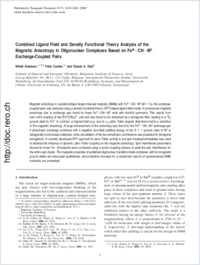Combined ligand field and density functional theory analysis of the magnetic anisotropy in oligonuclear complexes based on FeIII−CN−MII exchange-coupled pairs
- Atanasov, Mihail Institute of General and Inorganic Chemistry, Bulgarian Academy of Sciences, Sofia, Bulgaria - Anorganisch-Chemisches Institut, Universität Heidelberg, Germany - Département de Chimie, Université de Fribourg, Switzerland
- Comba, Peter Anorganisch-Chemisches Institut, Universität Heidelberg, Germany
- Daul, Claude Département de Chimie, Université de Fribourg, Switzerland
-
27.02.2008
Published in:
- Inorganic Chemistry. - 2008, vol. 47, no. 7, p. 2449–2463
English
Magnetic anisotropy in cyanide-bridged single-molecule magnets (SMMs) with FeIII−CN−MII (M = Cu, Ni) exchange-coupled pairs was analyzed using a density functional theory (DFT)-based ligand field model. A pronounced magnetic anisotropy due to exchange was found for linear FeIII−CN−MII units with fourfold symmetry. This results from spin–orbit coupling of the [FeIII(CN)₆]³⁻ unit and was found to be enhanced by a tetragonal field, leading to a ²Eg ground state for FeIII. In contrast, a trigonal field (e.g., due to τ2g Jahn–Teller angular distortions) led to a reduction of the magnetic anisotropy. A large enhancement of the anisotropy was found for the FeIII−CN−NiII exchange pair if anisotropic exchange combined with a negative zero-field splitting energy of the S = 1 ground state of NiII in tetragonally compressed octahedra, while cancellation of the two anisotropic contributions was predicted for tetragonal elongations. A recently developed DFT approach to Jahn–Teller activity in low-spin hexacyanometalates was used to address the influence of dynamic Jahn–Teller coupling on the magnetic anisotropy. Spin Hamiltonian parameters derived for linear Fe−M subunits were combined using a vector-coupling scheme to yield the spin Hamiltonian for the entire spin cluster. The magnetic properties of published oligonuclear transition-metal complexes with ferromagnetic ground states are discussed qualitatively, and predictive concepts for a systematic search of cyanide-based SMM materials are presented.
- Faculty
- Faculté des sciences et de médecine
- Department
- Département de Chimie
- Language
-
- English
- Classification
- Chemistry
- License
- License undefined
- Identifiers
-
- RERO DOC 9553
- DOI 10.1021/ic701702x
- Persistent URL
- https://folia.unifr.ch/unifr/documents/300753
Statistics
Document views: 67
File downloads:
- daul_clf.pdf: 161
